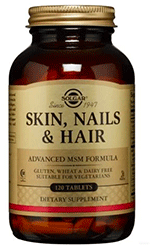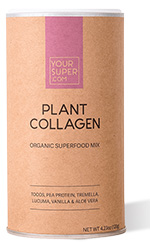
I always thought it was collagen, just that one word. I hadn’t the faintest idea there is a difference between animal collagen vs plant collagen.
Moreover, collagen had a bad reputation in my mind because of the ads. You might know which ads I mean: Look 20 years younger by using our product with Collagen XXL. I distrusted the claims and I hated the implication I didn’t look good the way I was.
The worst one was a promo on Dutch TV. Imagine the scene: a grandmother is happily playing with her grandson who is laughing and having fun as well. All of a sudden he stops in mid-play, points an accusing finger at her face and says: Gran, why does your skin look so awkward?
Yeah, right. As if a child of 5 would care. But we, wrinkly old berries, were supposed to be ashamed to death and run to the store right away.
Some of the links are affiliate links. As an affiliate associate, we earn a commission when you purchase any of the products offered through the shared links at no extra cost for you. This helps us maintain this website.
Table of contents
Animal collagen vs Plant collagen
Animal collagen is made from the remains of fish, beef, or pig. Plants do not contain collagen, because collagen is an animal product. What justifies the name is that the combination of vegetal substances in collagen supplements helps the body produce natural collagen itself.
What is Collagen?

So for years, I thought collagen was a marketing word. Until I found out collagen is a needed material of our own body. Duh!
Collagen is a type of amino acid with which our body builds muscle, bone, cartilage, skin, hair, connective tissue and much more. Amino acids are building blocks for the protein in body cells.
There are more than 28 (!) different types of collagen. Types I to IV are the most important and most present in our body.
Studies show that taking collagen is very good for our joints. It could reduce arthritis and thus act as a pain reliever. A 2009 study in the International Journal of Medical Sciences says “4 of 4 arthritis patients who took 40 mg of collagen daily saw their pain decrease by an average of 26%”.
Is taking a collagen supplement beneficial for our skin?
While ageing the body produces less collagen. The marketing messages respond smartly to this by stating our skin gets healthier by taking collagen. Scientists (for instance dermatologist Adam Friedly) fight the message, claiming that collagen is digested without being absorbed by the body.
To me, these are mixed messages. Because if the collagen is not absorbed by the body how can it help against the pain of arthritis?
The websites that aim specifically at collagen in all its forms claim scientific research that backs up the advantages I list later in this article.
I haven’t found (yet) which studies these are, so I can’t say who has financed this research. Usually finding the name of a sponsor gives an indication of the credibility of the study.
Cosmetic use
There are quite a number of collagen types used in cosmetic creams. Mainly bovine collagen and fish collagen. Collagen is also widely used in plastic surgery, because it binds tissue and is easy to use as a skin filler. And collagen is used in shampoo to make the hair appear fuller.
You can guess that I get a little itchy from these facts. I haven’t completely lost my aversion to collagen marketing messages! And cosmetic plastic surgery, because someone is not satisfied with her body, in particular, is nonsense in my opinion. Wish-medicine I call it. Those resources can be better used for helping (burn) victims and for medical research.
Some types of collagen
Collagen is an animal product. You will not find collagen in plants. The skin contains Type I and Type III, tendons contain only Type I, and cartilage contains Type II.

Fish collagen
Fish collagen is the purest form of collagen. Its structure is comparable to that of the human skin. The skin and fish bones are used for the production of collagen powders. With a broth that is drawn from the fish bones, we also ingest collagen.
- Healthier skin;
- Less wrinkling;
- Effect as an antioxidant.
Bovine collagen
Bovine collagen has almost the same properties as human skin. The BSE outbreak, mad cow disease, has reduced the use of collagen due to fears that the disease could be transmitted.
- Improved intestinal health;
- Better recovery from intensive sports training;
- Collagen can improve your muscle strength;
- Reduced joint pain;
- Radiating skin;
- Healthy and shiny hair;
- Strong nails;
- Better digestion.
Pig Collagen
Pig collagen has also been used in cosmetic wrinkle treatment for several years.
Plant Collagen
YourSuper has a product called Plant Collagen. Plants do not contain collagen, because collagen is an animal product. What justifies the name is that the combination of vegetal substances in collagen supplements helps the body produce natural collagen itself.
Vitamin C is important in the production of the body’s own collagen and the body also needs a supply of amino acids such as glycine and proline. The mix of the different vegetal powders is important.
Personal preference
I prefer plant collagen above animal collagen:
- Focus on production by the body itself;
- Easier to digest;
- Better for the planet and animal welfare.
I am an enthusiastic user of Your Super products because I love their products and also because of their packaging. That’s why I am an affiliate partner of them. If you order and use our code OURGREENHEALTH at checkout you’ll get 15% reduction.
YourSuper Plant Collagen
Taste: Neutral flavour with a hint of vanilla
Ingredients:
- Tocos* – rice bran solubles (Thailand);
- Pea Protein* – made by extracting protein from yellow peas (Belgium);
- Tremella* – a kind of mushroom (China);
- Lucuma* – a kind of fruit (Peru);
- Vanilla* – a flavouring agent derived from the fruits of the climbing orchid of the genus Vanilla (Madagascar);
- Aloe Vera* – a kind of succulent (China).
*= Organic certified

Every ingredient of this product, but also of the other YourSuper products is certified organic, non-GMO certified, glyphosate-free, plant-based and gluten-free. There are no sweeteners, stevia, artificial flavours, fillers, preservatives or additives in them.
They have a 100% transparent supply chain. YourSuper sources all of their ingredients directly from the farmers, they know where they come from and try to have a positive impact on the local communities where they’re sourced.
The latter makes it such a sympathetic company for me. I am convinced that the world is being exploited, so every bit I can do to improve that through my choice of brands is an advantage.
Final words on animal collagen vs plant collagen
The question remains why I would use collagen. It’s pretty clear that I have my reservations. Well, what struck me was that enough collagen production in the body can relieve arthritis pain. As my hands are painful at times, it’s worth investigating if this might help me. I’ll keep you posted.
What are your thoughts about collagen? Tell me in the comment box.



Hi, Hannie,
Wonderful post! I’ve learned a lot about collagen.
I have a question: Is there any scientific research that says that combination of those plant substances helps the body to produce natural collagen on its own?
I appreciate your feedback on this!
Cheers,
Ionut
Hi Ionut, good question. Science spends more time investigating medication than healthy food. But that is my personal opinion. But I am quite sure the answer to your question is no.
According to Healthline the body makes its own collagen through several different foods. Most of what they mention are animal products which already contain collagen. Which makes the information confusing.
The superfoods that come in the plant collagen box add the right vitamins and proteins to allow the body to make its own collagen, but whether it would matter if you eat more of one element than the other, I very much doubt. But that’s just a logical thought on my part: the healthy body is a great machine and when we take in too much of a substance, it is naturally disposed of.
My mum also suffers from arthritis in her hands. I have been told about supplementing with collagen before and wondered if I should get some for her. I’ll be interested in hearing about your results.
YourSuper Plant Collagen sounds like the best one to buy. I also like the idea that it is ethically sourced and the communities directly benefit from the trade.
I wonder why our bodies stop producing enough collegen for it’s own needs as we age?
Thanks for the information.
Hi Andrew, so far the perspective is looking good. My hands are in reasonable shape now and getting better. But I must add I also do excercises specifically for my hands. (I should make an article about that as well! I might do that for my other website, thanks for the inspiration!)
It’s not just the production of collagen that diminishes while aging – all of our functions do, unless we take precautions. And the precautions only help to a certain level as you can understand. Our metabolism slows down and the physical parts get rusty by lack of enough movement. Wear makes everything a bit more laborious, so that we move even less, which speeds up the process. This can become a vicious circle unless we consciously build movement into our day. And also have a healthy eating style.
I hope your Mum’s hands can recover. One of my acquaintances was slack with his exercises and also didn’t stick to the best diet, so unfortunately his fingers are already irreparably deformed. I am sure we can prevent that from happening by living conciously.
Take care.
I’m yet to hit 40 and one of my knees is giving out. I knew that collagen is good for bad joints but I didn’t realize that there are a few types, or even we could induce our body to produce with plants.
That’s really an eye-opener. I think going by the ‘plant’ route sounds sensible. I’ll try it out.
Oof, Kenny, I am so sorry to hear that. Yes please, do everything you can to better your knee, it has to carry you for another 40 years at least. Try a combination of the right foods and exercises. I know some exercises will work against your bad knee, so be careful which ones you choose, but I know from my own experience that sitting and doing nothing makes everything worse.
Good luck and take care.
Hannie,
I’ve been looking into collagen as a pain reliever for some of my own joint pain, the reports that it wasn’t actually absorbed was a bit of a deterrent for me. Thanks for addressing that in the article. I’m curious about why you feel plant collagen is the way to go, I’ve heard that fish collagen does more for pain relief. I tried to find the link to include it but wasn’t successful.
Looking forward to your reply.
Thanks,
Sean
Hi Sean, I have 2 reasons for preferring the plant collagen:
1) it’s my strong opinion that the body should heal itself wherever and whenever possible. Animal collagen is a source from the outside, plant collagen is a source from the inside, because it lets the body make the collagen itself.
As the ancient Greek physician Hippocrates said: “Let food be your medicine”. Even though this website is about supplements, those supplements are not always pills. Food always comes first for me and I love these superfood powders (LOL, the latter is obvious, isn’t it). 😉
2) For environmental reasons I want to use the earth’s resources as little as possible. So I only occasionally eat meat or fish because of the fats and vitamin B12 and then only from an organic source. I want to obtain the rest of the nutrients from vegetable sources.
Take care and don’t hesitate is you have more questions!
Great article Hannie!
I think plant base seems like a much better choice because it seems to help your body production of collagen!
Thank you for the information, as I had no idea about the different types of collagen, but now I understand!
Keep Being AMAZING!
We do take some things as granted with our bodies, like a good looking skin and pain-free, healthy state of it. Then, we start to do whatever we can to ruin it. That’s also the case with the collagen production, I guess. Not only it starts to decline already after the age of 25, but we smoke, we tan, we eat unhealthy foods, we don’t move…
Thank you for introducing this product, I have to say I’ve never heard of it.
Plant collagen-hmmm-as it does not contain any collagen, of course, the name is a bit strange, but I suppose there isn’t any better one for something that promotes, i.e. creates a perfect environment for the body to produce one.
Do you happen to use this for a while now already? You have probably noticed already some results, with your skin perhaps? I’m also looking forward to read your results for your arthritis as it is such a common problem amongst my friends and it probably awaits me, too.
Hi Kerryanne, yes, I am using it now, but just for a couple of weeks. So I think the time is too short to say anything meaningful about it. I do think it helps, but I want to have more certainty.
And I agree with you concerning the name. It’s similar to the vegetarian butcher, which is a stupid name as well. But I would never have noticed it, if the name had been different. 🙂